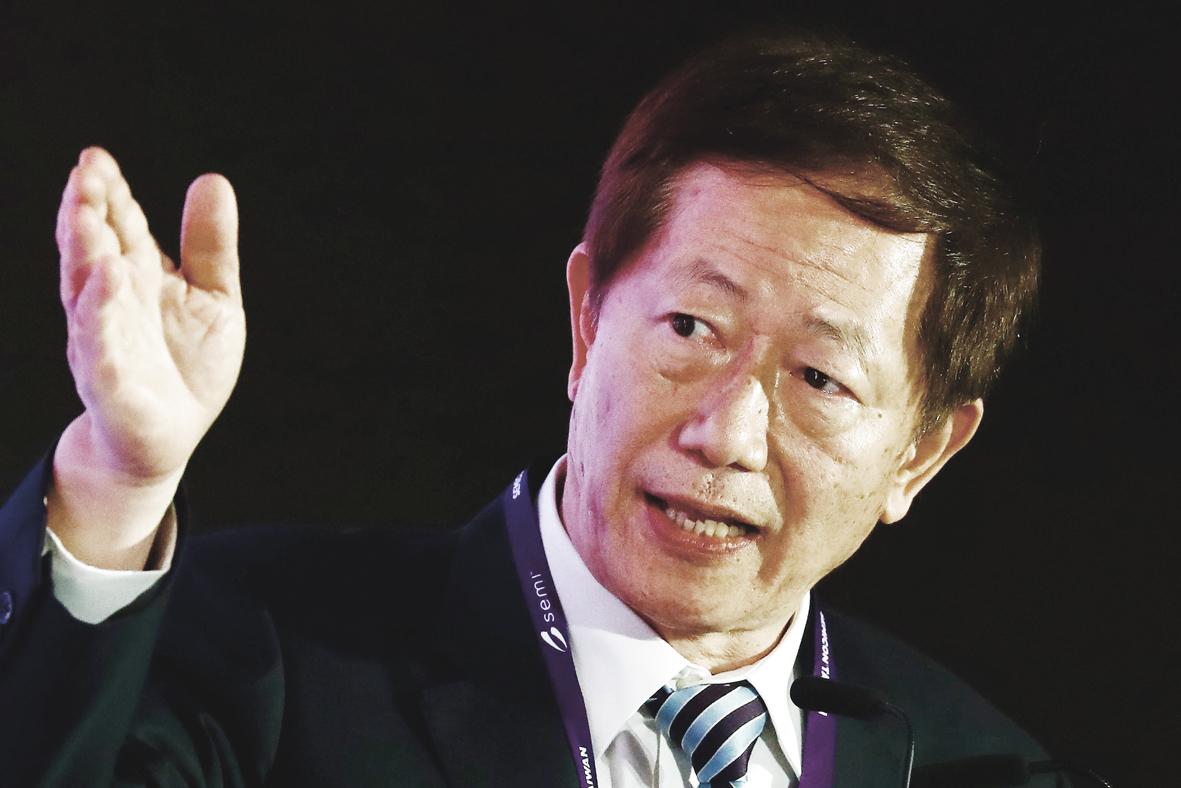Taiwan Semiconductor Manufacturing Co’s (TSMC, 台積電) shares fell 1.68 percent yesterday after the chipmaker warned about the risk of overcapacity with regards to less advanced semiconductor technology.
The world’s biggest contract chipmaker on Tuesday said that the COVID-19 pandemic and US-China trade tensions have led to “double booking” by clients amid mounting uncertainty over chip sourcing, which is part of the reason for the chip supply crunch.
The pandemic has disrupted supply chains and driven inventory stockpiling, and the supply of chips and other raw materials is unpredictable, TSMC chairman Mark Liu (劉德音) told reporters on the sidelines of the annual Taiwan Semiconductor Industry Association convention in Hsinchu.

Photo: Ritchie B. Tongo, EPA-EFE
Liu used the severe shortage of 28-nanometer chips, mostly used in vehicles, as an example.
In reality, global 28-nanometer capacity surpasses market demand, he said.
The tight supply of 28-nanometer chips is actually a problem of allocation, which cannot be resolved by expanding capacity, he said.
TSMC would do its best to distinguish inventory from real demand, or urgent demand, before allocating its chip supply, he said.
Last year, 13 percent of TSMC’s revenue came from 28-nanometer chips, down from 16 percent a year earlier.
United Microelectronics Corp (UMC, 聯電) is more bullish about 28-nanometer chips.
Due to healthy customer demand, the company has said that it cannot find any spare capacity for almost all types of chips, including 28-nanometer chips.
UMC has said that it expects 28-nanometer chips to account for 25 percent of its revenue this year, compared with 14 percent last year.
Separately, TSMC said that its production was not affected by a substation malfunction at one of its 12-inch fabs in Hsinchu yesterday.
One subcontracted worker was hospitalized due to the incident as he had inhaled too much carbon dioxide, the company said.
TSMC shares closed at NT$587 in Taipei trading yesterday.
Over the past month, the stock has tumbled 3.14 percent, underperforming a 2.99 percent rise on the TAIEX over the same period.

NOT JUSTIFIED: The bank’s governor said there would only be a rate cut if inflation falls below 1.5% and economic conditions deteriorate, which have not been detected The central bank yesterday kept its key interest rates unchanged for a fifth consecutive quarter, aligning with market expectations, while slightly lowering its inflation outlook amid signs of cooling price pressures. The move came after the US Federal Reserve held rates steady overnight, despite pressure from US President Donald Trump to cut borrowing costs. Central bank board members unanimously voted to maintain the discount rate at 2 percent, the secured loan rate at 2.375 percent and the overnight lending rate at 4.25 percent. “We consider the policy decision appropriate, although it suggests tightening leaning after factoring in slackening inflation and stable GDP growth,”

DIVIDED VIEWS: Although the Fed agreed on holding rates steady, some officials see no rate cuts for this year, while 10 policymakers foresee two or more cuts There are a lot of unknowns about the outlook for the economy and interest rates, but US Federal Reserve Chair Jerome Powell signaled at least one thing seems certain: Higher prices are coming. Fed policymakers voted unanimously to hold interest rates steady at a range of 4.25 percent to 4.50 percent for a fourth straight meeting on Wednesday, as they await clarity on whether tariffs would leave a one-time or more lasting mark on inflation. Powell said it is still unclear how much of the bill would fall on the shoulders of consumers, but he expects to learn more about tariffs

Greek tourism student Katerina quit within a month of starting work at a five-star hotel in Halkidiki, one of the country’s top destinations, because she said conditions were so dire. Beyond the bad pay, the 22-year-old said that her working and living conditions were “miserable and unacceptable.” Millions holiday in Greece every year, but its vital tourism industry is finding it harder and harder to recruit Greeks to look after them. “I was asked to work in any department of the hotel where there was a need, from service to cleaning,” said Katerina, a tourism and marketing student, who would

i Gasoline and diesel prices at fuel stations are this week to rise NT$0.1 per liter, as tensions in the Middle East pushed crude oil prices higher last week, CPC Corp, Taiwan (台灣中油) and Formosa Petrochemical Corp (台塑石化) said yesterday. International crude oil prices last week rose for the third consecutive week due to an escalating conflict between Israel and Iran, as the market is concerned that the situation in the Middle East might affect crude oil supply, CPC and Formosa said in separate statements. Front-month Brent crude oil futures — the international oil benchmark — rose 3.75 percent to settle at US$77.01